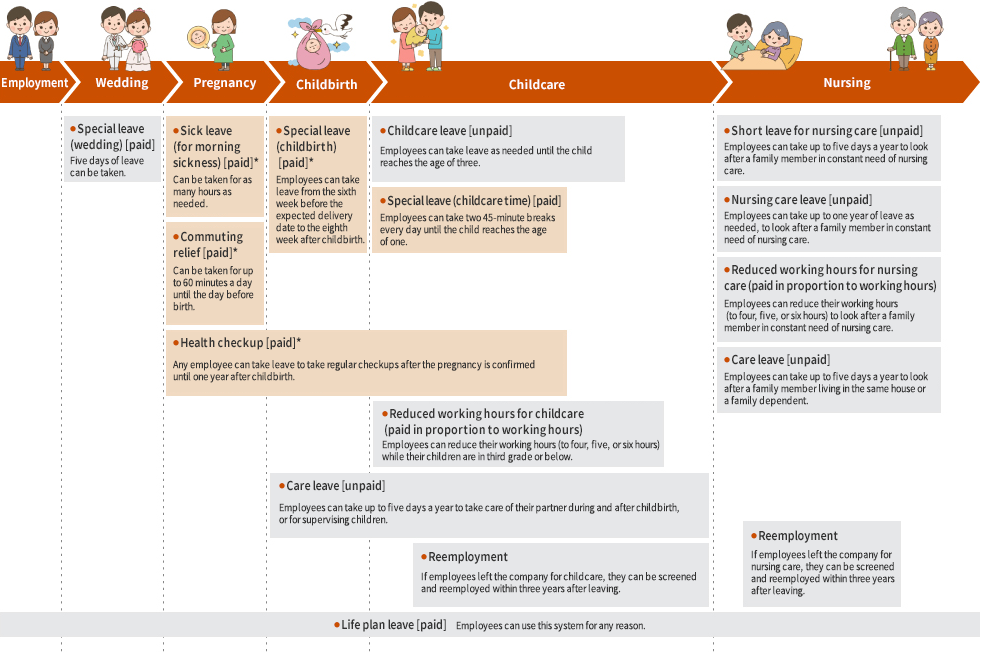Microsoft ends support for Internet Explorer on June 16, 2022.
We recommend using one of the browsers listed below.
- Microsoft Edge(Latest version)
- Mozilla Firefox(Latest version)
- Google Chrome(Latest version)
- Apple Safari(Latest version)
Please contact your browser provider for download and installation instructions.
Systems and structures
NTT is promoting a deeper understanding of work-life management across all workplaces and is fostering a culture for accepting a wide range of work styles.
To further promote work-life management, we have implemented many useful systems to cover different life events.
Life events and relevant systems at a glance
only available for female employees

Work styles

A variety of systems to promote work-life management
Leave systems
| Name and details | Salary payment |
|---|---|
|
Annual paid leave This paid leave can be taken for any purpose. Every year, 20 days of leave are granted to employees that have completed at least one full year of service (13 days for employees who have not yet completed one full year of service). |
Paid |
|
Special leave Available for the following purposes: Purposes: Wedding, bereavement, summer vacation, childbirth, childcare time, menstrual period, etc. |
Paid |
|
Life plan leave Up to three days of paid annual leave that would be normally lost at the end of the year can be retained annually as life plan leave days that can be used for any reason. In addition, employees are granted five life plan leave days for every five years of service (up to a total of 40 days). Purposes (examples): Relaxation and recuperation, family care, childcare, etc. |
Paid |
|
Sick leave Can be used when injured or ill Purposes: Illness, injury, morning sickness, etc. |
Paid |
Childbirth and childcare support
only available for female employees
| Name and details | Salary payment |
|---|---|
|
Commuting relief during pregnancy * System that exempts employees from up to 60 minutes of work per day at the beginning or end of work hours |
Paid |
|
Health checkups during pregnancy and after childbirth * System that exempts employees from work if they receive health guidance or take health checkups during pregnancy and for one year after childbirth |
Paid |
|
Special leave (childbirth)* Special leave system where employees can take leave from the sixth week (the 14th week for a multiple pregnancy) before the expected delivery date to the eighth week after childbirth |
Paid |
|
Special leave (childcare time) System that grants up to two 45-minute childcare breaks (one hour breaks for twins) for female employees looking after babies under the age of one year. |
Paid |
|
Childcare leave System where any employee can take leave to look after a child under the age of three |
Unpaid |
|
Reduced working hours for childcare System where any employee can reduce their working hours (to four, five, or six hours) while their children are in third grade or below |
In proportion to working hours |
|
Shift work for childcare System where employees can work in shifts while their children are in third grade or below |
-- |
|
Exemption from overtime System that exempts employees from overtime while their children are in preschool |
-- |
|
Restrictions on overtime and late-night work System that places restrictions on overtime and late-night work while employees' children are in third grade or below |
-- |
Nursing care support
| Name and details | Salary payment |
|---|---|
|
Nursing care leave System where any employee can take leave if they have a family member in need of nursing care |
Unpaid |
|
Reduced working hours for nursing care System where any employee can reduce their working hours (to four, five, or six hours) if they have a family member in need of nursing care |
In proportion to working hours |
|
Shift work for nursing care System where employees can work in shifts for up to three years if they have a family member in need of nursing care |
-- |
|
Restrictions on overtime and late-night work System that places restrictions on overtime and late-night work for employees who have a family member in need of nursing care |
-- |
Work-related systems
| Name and details | Salary payment |
|---|---|
|
Shift work Individual employees can change the time they start and finish work in relation to childcare and nursing care |
-- |
|
Flextime work System where employees can decide the time they start and finish work every day. |
-- |
|
Work from home Employees can use this system for tasks judged to be feasible by direct superiors |
-- |
|
Reemployment system System where any former employee who left the company for childcare, nursing care, or their partner's transfer can be reemployed if they apply for this when leaving |
-- |
Diversity and Inclusion
NTT STORY
WEB media that thinks about the future with NTT










